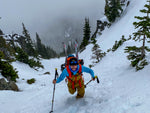6 Veterans who Advanced the Sport of American Alpinism
The mountains are a testament to the power of the human spirit – the drive to reach higher, push further, and test against the grand scale of nature. It's perhaps no surprise that among legendary mountaineers, we find a disproportionate number of military veterans. Those who've served their country already possess extraordinary grit, a deep understanding of teamwork, and the ability to thrive in unforgiving environments.
This Memorial Day, we salute a few of these exceptional individuals who left their mark both on battlefields abroad and the wild peaks of North America.
The Whittakers – Everest & Endless Ascents

Lou and Jim at Camp Hale, Colorado, in the 1950's
Let's start with the hometown heroes: Lou and Jim Whittaker. During the Korean War, these twin brothers honed their mountaineering skills in the U.S. Army's 10th Mountain Division. While Jim famously became the first American to stand atop Everest, Lou's impact is just as undeniable. He's racked up a staggering 250+ Rainier summits, built RMI into a world-class guiding operation, and advocated tirelessly for responsible use of the mountain he calls home. His founding of Rainier Mountaineering, Inc. (RMI) democratized adventure, allowing countless climbers to experience high-altitude challenges safely. The Whittakers show us that mountain life is a long one – and the rewards of service reach far beyond one iconic summit.
Unsoeld, Schoening & the Audacity of 'The Hard Way'

Photo 1: Wili Unsoeld | Photo 2: Pete Schoening
Mountaineers talk of "style" – how elegantly a route is solved. The 1963 American Everest team, including Willi Unsoeld and Tom Hornbein, embodied audacious style. Choosing the unclimbed West Ridge, they pushed the limits of high-altitude mountaineering. Unsoeld, a Navy man turned Peace Corps volunteer, was the quintessential expedition philosopher, musing on wilderness ethics as effortlessly as he tackled technical ice.
Pete Schoening, also an Army veteran, is less famous for reaching K2's summit than what happened on the descent. When multiple team members slipped, his now-legendary "Belay" – stopping their fall single-handedly – epitomizes selfless courage in dire situations. He went on to influence climbing safety for decades, developing new equipment that undoubtedly saves lives on mountainsides today.
Washburn & Houston: Photography and Medicine
Bradford Washburn and Charles S. Houston were pioneers in combining scientific inquiry with mountaineering excellence, each contributing uniquely to the sport.

Washburn and his wife Barbara on the summit of Mt. Bertha, Alaska, 1940. Photo by Tom Winship. ©Bradford Washburn Estate. Courtesy of DecaneasArchive.com
Bradford Washburn served as a consultant to the U.S. Army Air Forces during World War II, where his aerial photography and mapping expertise proved invaluable. His military service translated seamlessly into his mountaineering career, where his detailed maps and photographs became crucial resources for climbers. Washburn made numerous first ascents in Alaska, including Mount Lucania and Mount Crillon, and his work in mapping Denali has set the stage for the routes we climb today.

Charles Houston crossing a rope bridge on his way up K2
Charles S. Houston, on the other hand, served as a medical officer in the U.S. Navy during World War II. His medical background profoundly influenced his approach to mountaineering, particularly his interest in high-altitude physiology. Houston led the 1938 and 1953 American expeditions to K2, which, despite not summiting, were groundbreaking regarding the knowledge and experience gained. His work in high-altitude medicine has improved safety and performance in mountaineering, emphasizing the physiological challenges climbers face at extreme altitudes.
Mountains as a State of Mind
These profiles offer a glimpse into the rich tapestry of mountaineers formed in the crucible of military service. Their achievements remind us that mountains provide the ultimate test of character, requiring the same grit and focus on far different battlefields. It's about knowing yourself, trusting your team, respecting the objective, and the simple audacity to keep putting one foot in front of the other, no matter how high the summit seems. The stories of veterans like the Whittakers, Unsoeld, Schoening, and Whipple teach us to embrace challenges and seek out the places where we discover our hard-won summits.









Great story of service and adventure!